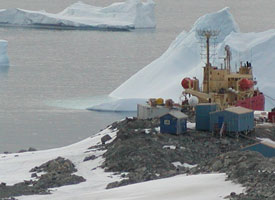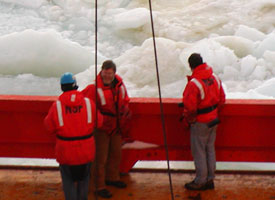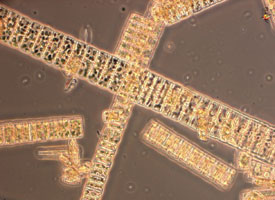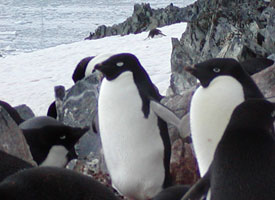 |

For further information, contact the MBL Communications Office at (508) 289-7423 or e-mail us at comm@mbl.edu
FOR IMMEDIATE RELEASE: July 7, 2008
Contact: Gina Hebert, 508-289-7725; ghebert@mbl.edu
New Ecosystem is Forming as Western Antarctica Rapidly Warms, MBL Scientist Reports
Loss of Sea Ice is Changing the Food Web
MBL, WOODS HOLE, MA—Dramatic shifts in the food web are emerging on the Antarctic Peninsula, where the climate is warming faster than anywhere else on Earth, report three polar scientists, including MBL Ecosystems Center director Hugh Ducklow, in the July/August cover story of American Scientist... More>>>
Resources
Citation:
McClintock, James, Hugh Ducklow and William Fraser. 2008. “Ecological Responses to Climate Change on the Antarctic Peninsula,” American Scientist 96: 302-310.
Full Article (pdf format)
 Audio (mp3 format) Audio (mp3 format)
Hugh Ducklow on climate-induced changes to the Western Antarctic food web. Interviewed by Diana Kenney, MBL Science Writer/Editor.
Hugh Ducklow is available for media interviews before July 9, when he leaves for a two-month stay in Antarctica.
Photos: Click photos for high-resolution images.
 |
 |
 |
Photo 1: Palmer Station in Western Antarctica, the fastest-warming place on the globe. Hugh Ducklow directs the National Science Foundation’s Long-Term Ecological Research project at Palmer Station. Photo credit: Hugh Ducklow.
|
|
Photo 2: Sea ice near Palmer Station, Western Antarctica, where a 90-day loss in annual sea-ice cover since 1978 has been recorded. The brown discoloration in the ice is from the growth of ice algae (photo 3). Credit: Amy Chiuchiolo, Virginia Institute of Marine Science.
|
 |
|
 |
Photo 3: Diatoms (phytoplankton) form the base of the Antarctic food web, and are threatened by loss of habitat as sea-ice cover continues to shrink over Western Antarctica. Photo credit: micro*scope, MBL
|
|
Photo 4: Adélie penguins, one of many local species that depend on sea ice to survive and complete their life cycle, are being displaced near Palmer Station by species that are not ice-dependent (chinstrap and gentoo penguins). Photo credit: Hugh Ducklow.
|
|